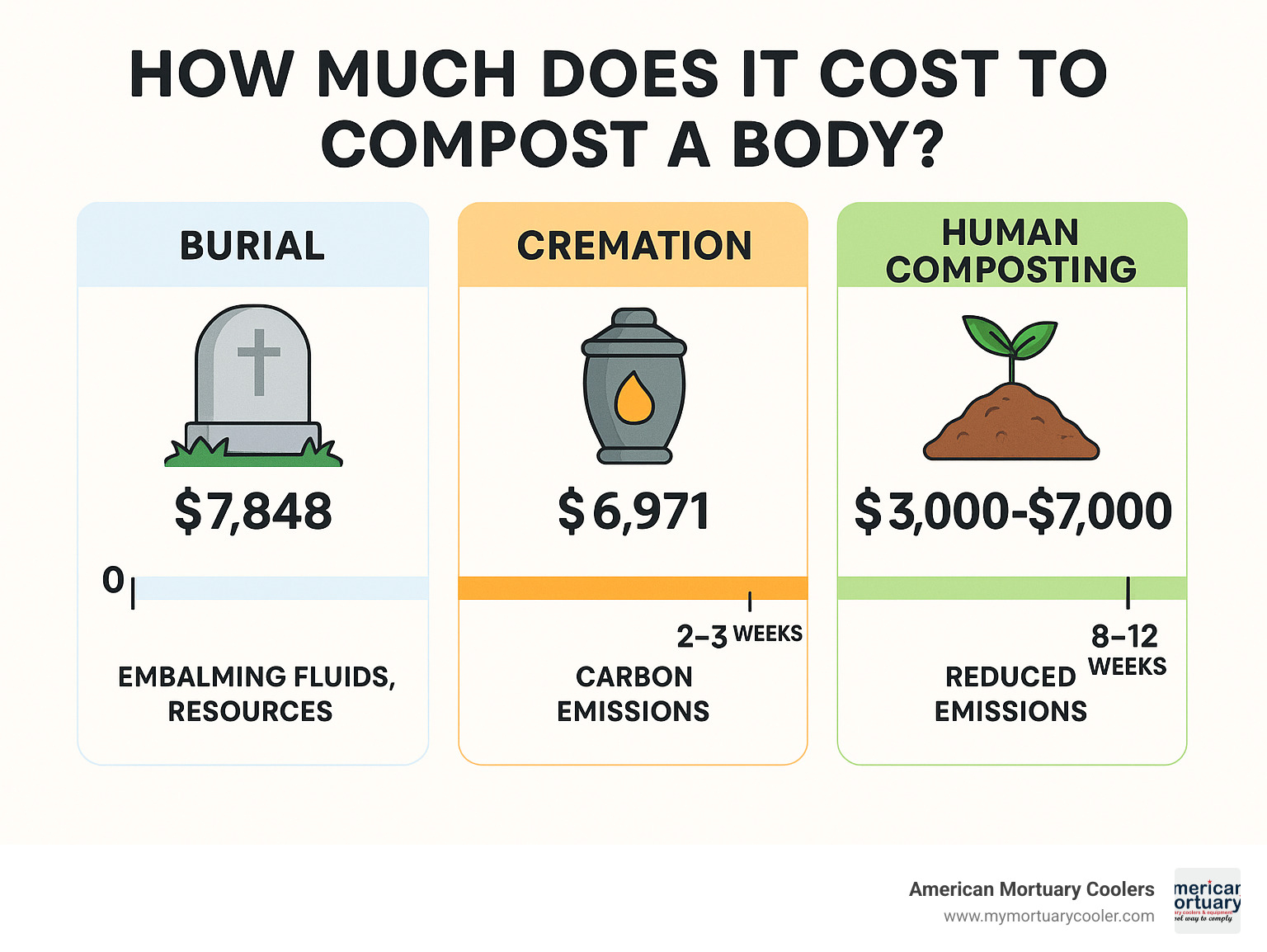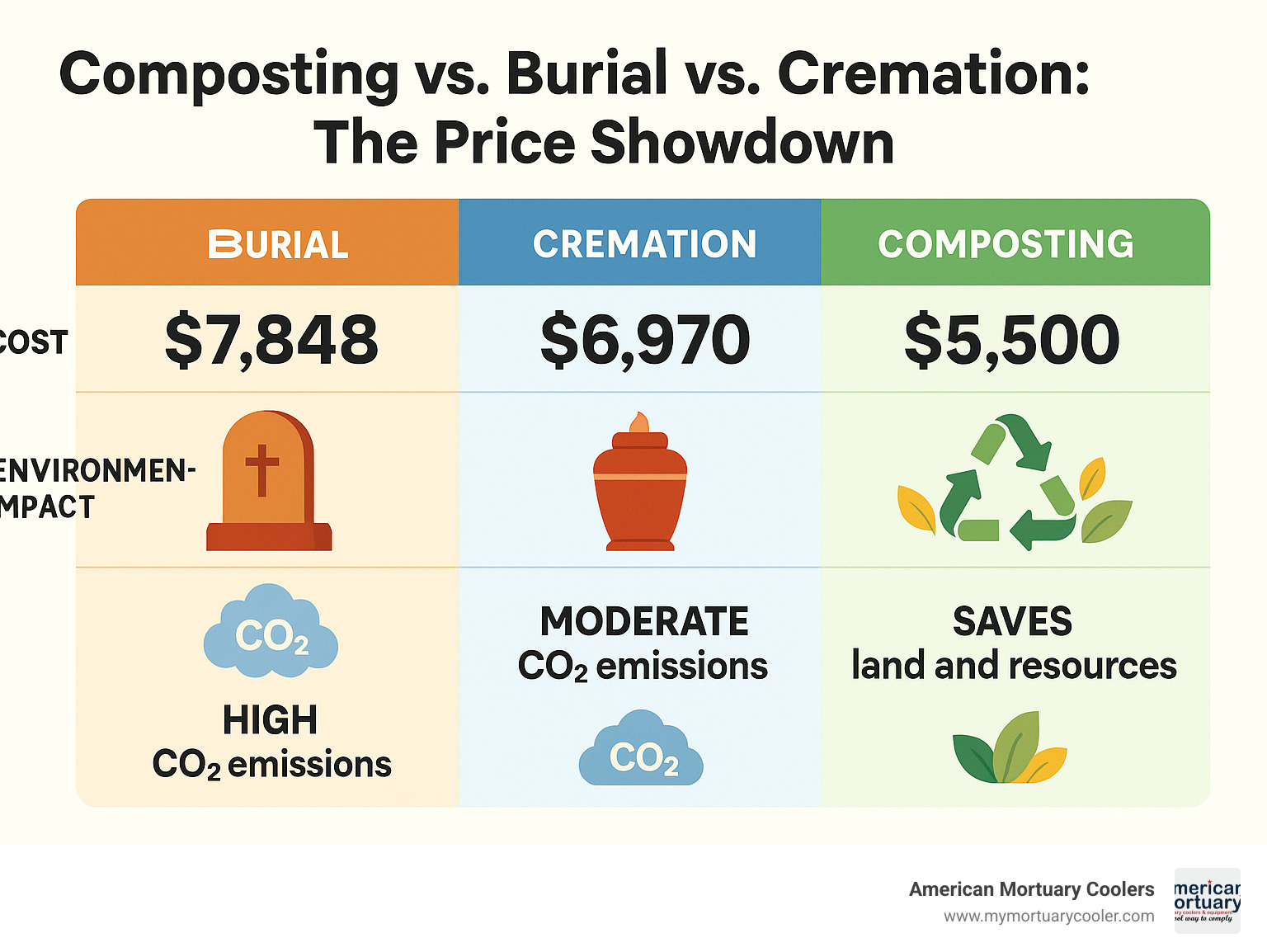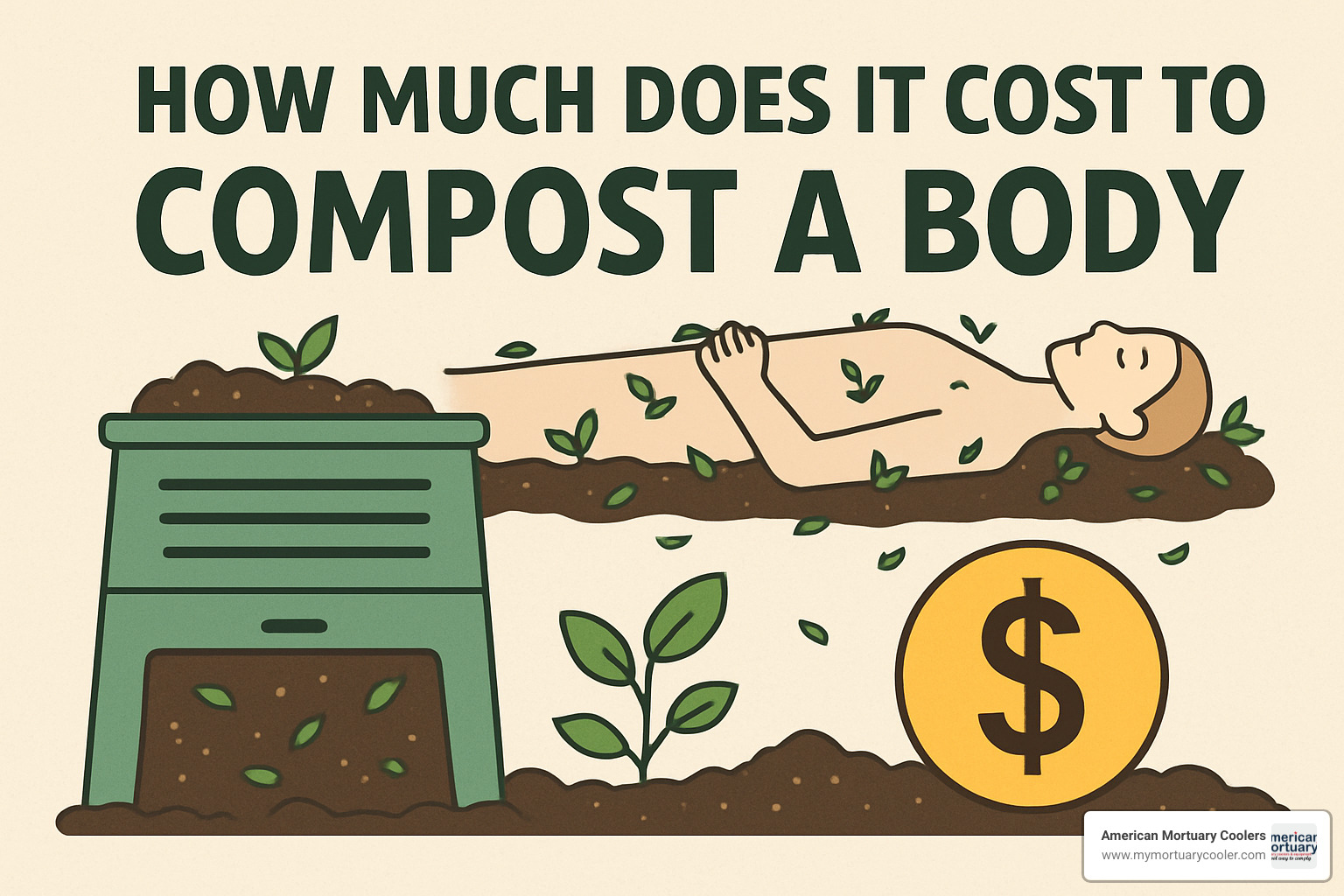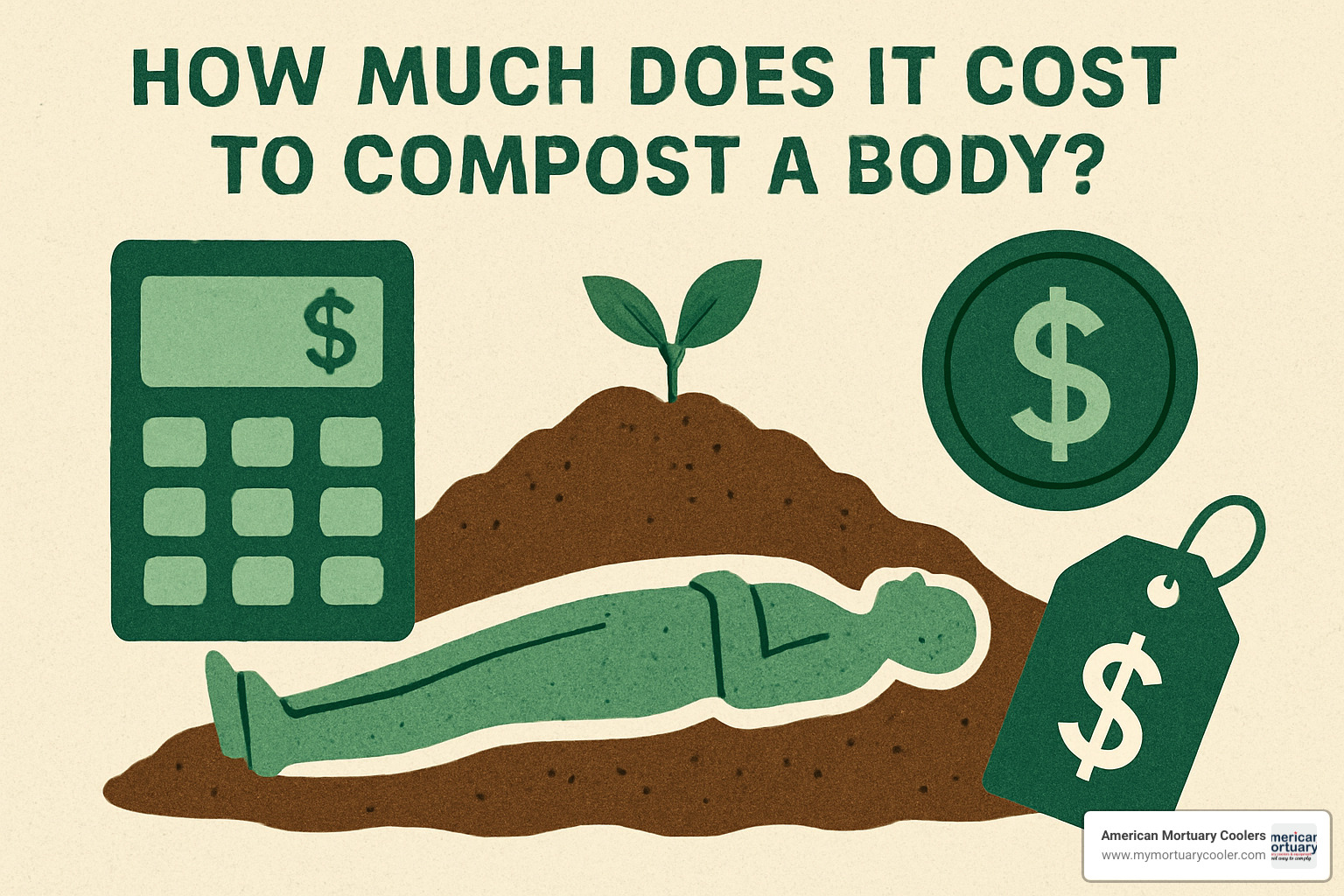Understanding the True Cost of Body Composting in 2024
How much does it cost to compost a body ranges from $3,000 to $7,000 depending on the provider and services included. Here's what you need to know:
Quick Cost Breakdown:
- Recompose (Seattle): $7,000 all-inclusive
- Return Home: $4,950 standard fee
- Earth Funeral: $5,000-$6,000 range
- Herland Forest: $3,000 (transport extra)
- Additional transport costs: $850-$3,000+ depending on distance
The human composting industry has exploded since Washington became the first state to legalize natural organic reduction in 2019. Now legal in 12 states, this eco-friendly alternative transforms bodies into nutrient-rich soil over 8-12 weeks.
Why the price matters: Traditional burial averages $7,848 while cremation costs $6,971 according to 2021 NFDA data. Human composting often falls right in the middle - but hidden fees can quickly change the math.
As Mortuary Cooler, I've helped funeral homes nationwide steer the equipment and logistics of human composting operations. Understanding how much does it cost to compost a body is crucial for funeral directors evaluating this growing service option and helping families make informed decisions.

How much does it cost to compost a body terms to learn:
What Is Human Composting & Why It Matters
Think of human composting as nature's way of completing the circle of life—but with a little scientific help. Also called natural organic reduction (NOR) or terramation, this process takes what happens naturally in forests and speeds it up in a controlled, respectful way.
Here's the beautiful part: instead of fighting against nature with chemicals and concrete vaults, human composting works with natural processes. Bodies are gently transformed into nutrient-rich soil through microbial science—the same tiny organisms that have been recycling organic matter for millions of years.
The environmental impact is honestly pretty amazing. Human composting uses one-eighth the energy of flame cremation and prevents about one metric ton of CO₂ emissions per body. That's like taking a car off the road for 2,500 miles. It also eliminates the methane emissions that happen when bodies decompose in traditional burial conditions.
And here's something that might surprise you: the funeral industry uses about 800,000 gallons of toxic embalming chemicals annually in the U.S. Human composting skips all of that completely.
For families wondering how much does it cost to compost a body, the environmental savings often help justify the investment. You're not just saving money compared to traditional burial—you're creating something life-giving.
The process creates approximately one cubic yard of soil that can nourish memorial trees, gardens, or conservation projects. Many families find deep meaning in this living legacy, especially those who prioritized environmental stewardship throughout their lives.
Beginners Guide to Human Composting: What Is It?
Step-by-Step Overview
The human composting process follows precise scientific steps to ensure everything is safe and complete. It's actually quite gentle when you understand what's happening.
Body preparation starts with washing and dressing the deceased in biodegradable shrouds or natural fiber clothing. No synthetic materials—everything needs to break down naturally.
The body is then placed in specialized vessels—usually 8x4-foot steel cylinders—along with wood chips, straw, and alfalfa. These organic materials help create the perfect environment for beneficial microbes to do their work.
Temperature control is crucial. The vessels maintain 130-160°F through controlled aeration and natural microbial activity. This heat kills pathogens while keeping the process moving at the right pace.
During the 30-40 day active phase, operators regularly monitor, blend, and manage oxygen levels. It's like tending a very special garden that requires constant attention.
Bone processing happens next. Remaining bones and teeth are carefully removed, ground to powder, and mixed back into the soil. Nothing is wasted—everything becomes part of the final product.
The curing phase takes another 3-5 weeks for final soil maturation. Rigorous testing checks for E. coli, Salmonella, and other contaminants before families receive their soil.
Soil return is the final step. Families typically receive 500-1,000 pounds of finished, tested soil—enough to plant a memorial garden or donate to conservation projects.
The entire process takes 8-12 weeks from start to finish. When families ask how much does it cost to compost a body, part of that investment covers this careful, scientifically-monitored timeline.
How Much Does It Cost to Compost a Body?
When families ask how much does it cost to compost a body, the answer isn't as straightforward as you might expect. The price range spans from $3,000 to $7,000 depending on which provider you choose and what services you need.
Recompose in Seattle offers the most comprehensive package at $7,000, covering everything from the moment of death through soil return. This all-inclusive approach means no surprise bills later - they handle death certificate filing, legal paperwork, online obituary publication, soil packaging, and even provide access to their peaceful memorial spaces during the process.
Return Home in Auburn, Washington takes a different approach with their $4,950 standard fee. They've built their reputation on serving families across 49 states plus Canada, making human composting accessible far beyond the Pacific Northwest. Their 60-day terramation process includes both active composting and curing phases, plus they offer beautiful laying-in ceremony options.
Earth Funeral operates in the $5,000-$6,000 range and focuses heavily on environmental partnerships. They've created unique tree planting programs where your loved one's soil directly nourishes memorial forests. Their pricing varies based on which services you select, giving families more control over their final costs.
For budget-conscious families, Herland Forest offers the most affordable option at $3,000. However, this base cost doesn't include transportation or additional funeral services, so it works best for local families who can arrange their own logistics.
Community funds help make human composting more accessible. Recompose, in particular, offers reduced pricing for qualifying families who demonstrate financial need - because everyone deserves the option to leave a living legacy.
All About Human Composting Vessels
Average National Figures: How Much Does It Cost to Compost a Body in 2024?
Most families planning for how much does it cost to compost a body should budget around $5,500 for comprehensive services in 2024. This median figure reflects what you'll actually pay when all essential services are included.
Your investment typically covers body transportation to the facility, the complete natural organic reduction process, death certificate filing and permits, basic memorial space access, and soil packaging. Most providers give you one to five containers of finished soil (about 32 ounces each), with the option to donate remaining soil to conservation projects.
The processing timeline stays remarkably consistent across providers - expect 45 to 60 days from start to finish. Some facilities offer expedited services, but these come with premium pricing that can add 20-50% to your base cost.
Service bundles often provide better value than picking services individually. Recompose's $7,000 package covers literally everything from pickup to soil return, while providers with lower base rates might surprise you with additional fees for transportation, ceremonies, or extended soil storage.
Memorial options range from simple soil return to elaborate tree-planting ceremonies. These meaningful additions can increase your total investment by $500 to $2,000, but many families find the living memorial worth every penny.
Hidden Fees That Change How Much Does It Cost to Compost a Body
Transportation costs represent the biggest wild card when calculating how much does it cost to compost a body. Since most facilities operate in Washington state, distance from Seattle dramatically affects your final bill.
Local families within 100 miles usually get transportation included in their base price. Regional transport from places like Portland runs about $850. But cross-country transport from California can hit $3,000 or more, while international transport exceeds $5,000 with complex customs requirements.
Administrative expenses add up quickly too. Death certificate copies cost $25 each (and you'll need several), medical examiner fees range from $100 to $500 depending on circumstances, and permit processing adds another $50 to $200 per state involved.
Facility services beyond basic composting include ceremony space rental at $200 to $1,000 per event, extended body storage fees of $50 to $100 per day beyond standard timelines, and autopsy retrieval services that can add $500 to $1,500 to your bill.
Memorial upgrades let you personalize the experience but impact costs. Custom soil containers run $50 to $200 each, professional tree planting services cost $100 to $500 per tree, and memorial garden placement ranges from $200 to $1,000 depending on location.
Expedited services carry substantial premiums - expect 20-50% surcharges for rush processing, $500 to $1,000 extra for weekend or holiday services, and variable pricing for specialized handling requirements.
These hidden costs easily add $1,000 to $4,000 to advertised base prices. That's why transparency matters so much when comparing providers - the cheapest advertised rate rarely reflects what families actually pay.
Composting vs. Burial vs. Cremation: The Price Showdown

When families ask how much does it cost to compost a body, they're often comparing it to burial and cremation costs they've heard about. The numbers might surprise you.
Traditional burial hits families hard financially, averaging $7,848 according to 2021 NFDA data. But that's just the beginning. Add in a burial plot at $1,000-$5,000 (much more in cities), a headstone for $1,000-$3,000, and the required vault or grave liner at $1,000-$2,500. Many families end up spending $15,000-$25,000 or more when all the extras pile up.
Cremation with services comes in at $6,971 on average, while direct cremation (no services, just the cremation itself) costs around $2,185. That makes direct cremation the most budget-friendly traditional option.
Human composting sits right in the middle at $3,000-$7,000, with most families paying around $5,500. What makes it competitive is that these prices often include everything - no surprise cemetery fees, no ongoing plot maintenance, no vault requirements.
The timeline tells its own story. Traditional burial happens in 3-7 days, cremation takes 2-5 days, while human composting needs 45-60 days for the complete change. Some families appreciate this longer process as it feels less rushed during their grief.
Here's where it gets interesting from an environmental perspective. Human composting prevents one metric ton of CO₂ emissions per body compared to cremation. Traditional burial introduces toxic embalming chemicals and non-biodegradable materials into the soil. When you factor in the environmental impact, human composting delivers value beyond just the dollar amount.
The energy use comparison is striking too. Cremation requires intense heat for hours, while human composting relies on natural microbial processes that use one-eighth the energy. Traditional burial might seem passive, but consider the chemical impact of embalming fluids and the resources needed for casket manufacturing and vault production.
Latest research on funeral costs shows that funeral costs haven't risen as fast as inflation recently, but they're still a significant expense for most families. Human composting offers a middle ground - more meaningful than direct cremation for many families, but without the ongoing costs that make traditional burial so expensive over time.
What Drives the Final Bill?
Several key factors determine how much does it cost to compost a body, and understanding these variables helps families budget more accurately for this emerging death care option.
Body size and weight create the first pricing consideration. Most facilities set a 250-pound weight limit for their composting vessels. If your loved one approaches this threshold, expect additional fees ranging from $500 to $1,000. Some providers may require specialized handling that can double standard fees, while others simply cannot accommodate larger individuals due to equipment limitations.
State permits and regulatory compliance vary dramatically across the 12 states where human composting is legal. Washington state, being the pioneer, maintains streamlined permitting with minimal fees. However, newer states like California and New York have implemented more complex regulatory structures. Providers typically pass these bureaucratic costs directly to families through higher base prices.
The reality of facility availability significantly impacts pricing. With limited composting facilities nationwide, basic supply and demand economics drive costs higher in popular markets. Recompose's Seattle facility maintains premium pricing partly because demand consistently exceeds their capacity. Newer facilities in Colorado and California may offer promotional pricing to attract customers, but this advantage likely won't last long.
Transportation distance creates the most unpredictable cost variable when calculating how much does it cost to compost a body. Since most facilities operate in Washington state, geography becomes destiny for your budget. Local transport within 50 miles usually gets included in base pricing. Beyond that, costs escalate quickly - $200 to $500 for regional transport, $500 to $1,500 for cross-state moves, and a hefty $3,000 to $5,000 for cross-country transport.

Memorial ceremonies and add-on services can dramatically inflate your final bill. Basic soil return ceremonies typically cost $200 to $500, which feels reasonable for most families. However, elaborate tree-planting memorials with multiple family visits and custom landscaping can add $2,000 to $5,000 to your base fees. The emotional appeal of these services makes them popular, but they're not required for the composting process itself.
Soil shipping and storage present another cost consideration. Most providers include basic soil return in small containers, but families wanting the full cubic yard of finished soil face shipping costs of $200 to $800 depending on distance. Extended storage beyond 90 days typically runs $50 to $100 per month - a detail worth clarifying upfront.
Payment plans and financing options can help manage costs, especially for pre-need planning. Many providers offer 10% to 20% discounts for pre-arranged services compared to at-need pricing. Some facilities provide 0% financing for pre-planned arrangements, while families making at-need decisions may face higher rates or require full payment upfront.
Certain medical conditions create special handling requirements that affect pricing. Radioactive implants may require specialized disposal protocols, adding $1,000 or more to standard fees. Infectious diseases require improved safety measures, typically adding $500 to $1,500. Autopsy cases need additional transport coordination and handling, which usually costs an extra $500 to $1,000.
Understanding these cost drivers helps families make informed decisions about how much does it cost to compost a body in their specific circumstances. The key is asking detailed questions about each factor during initial consultations.
Human Composting: Mortuary Coolers, Racks, Lifts & 12 States
Legal, Environmental & Cultural Considerations
The legal landscape surrounding how much does it cost to compost a body creates a patchwork of regulations that directly impacts both pricing and availability across the United States.
Where Human Composting Is Currently Legal: As of 2024, human composting operates legally in 12 states: Washington, Colorado, Oregon, Vermont, California, New York, Nevada, Delaware, Hawaii, Illinois, Maryland, and Minnesota. Each state brings its own regulatory personality to the table, which funeral directors quickly learn affects their bottom line.

Washington state, being the trailblazer since 2019, has the most streamlined regulatory environment. This translates to more competitive pricing and fewer bureaucratic headaches. Contrast that with newer states like California, where complex licensing requirements mean providers factor additional compliance costs into their base fees.
The Expanding Legal Frontier: Over 20 states currently have human composting bills working their way through legislative processes. This expansion should be good news for families wondering how much does it cost to compost a body - more competition typically drives prices down while making services more geographically accessible.
Religious and Cultural Dynamics: Not everyone accepts human composting with open arms. The Catholic Church's 2016 Vatican instruction specifically opposes practices that completely disintegrate remains, creating cultural resistance in heavily Catholic regions. This religious opposition can limit facility development and affect local demand patterns.
However, many families find profound meaning in the process. One client beautifully described the resulting soil as "earthy, beautiful, vibrant, and life-giving." This emotional connection often justifies premium pricing for families who prioritize environmental stewardship as part of their legacy planning.
Environmental Return on Investment: The environmental benefits provide measurable value that extends far beyond the initial cost. Each composted body creates soil capable of sequestering additional carbon for decades to come. When you increase soil organic matter by just 1%, that soil can retain an additional 20,000 gallons of water per acre - a significant contribution to ecosystem health.
Memorial Tree Programs and Conservation Partnerships: Many providers have developed partnerships with conservation organizations to plant memorial trees using composted soil. These programs typically add $100-$500 per tree to the total cost, but they create lasting environmental legacies that resonate deeply with environmentally conscious families.
The programs contribute to reforestation efforts while giving families a living memorial they can visit for generations. For many, this transforms the question from simply how much does it cost to compost a body to "how much value can we create for future generations?"
An Essential Guide to Body Composting Laws in Washington State
Frequently Asked Questions About Body Composting Costs
Does insurance or pre-need planning cover human composting?
Here's the reality about insurance coverage for how much does it cost to compost a body: most traditional life insurance policies and pre-need funeral plans haven't caught up with this new option yet. Since human composting only became legal in 2019, many insurance companies are still figuring out their coverage policies.
The good news? If your life insurance policy provides cash benefits for funeral expenses, you can absolutely use that money toward composting costs. Think of it like getting reimbursed rather than having direct coverage.
Some forward-thinking insurance companies are starting to recognize human composting as a legitimate death care option, especially in states like Washington and Colorado where it's been available longest. It's worth calling your insurance provider to ask about their current stance.
Pre-need planning offers much better value. Most composting providers offer 10-20% discounts for families who plan ahead, plus you'll lock in today's prices against future increases. Many facilities also provide 0% financing options for pre-arranged services, making it easier to budget for this choice.
Can families receive all the soil or donate it?
The beautiful thing about human composting is the flexibility families have with the resulting soil. Each body creates approximately one cubic yard of nutrient-rich soil - that's about 500-1,000 pounds of earth that can nourish new life.
Most families don't need (or want) to handle that much soil, so providers offer several meaningful options. The partial return option comes included in your base price - you'll receive 1-5 containers of about 32 ounces each, perfect for a memorial garden or special plantings.
If you want the full soil return, expect to pay an additional $200-$800 for shipping and handling. That's a lot of soil to manage, but some families love the idea of creating extensive memorial gardens or sharing with multiple family members.
The donation option costs nothing extra and feels meaningful to many families. Your loved one's soil goes directly to conservation projects, helping restore forests or create new green spaces. It's a way to give back to the earth while keeping some soil for personal remembrance.
Memorial tree plantings offer a middle ground at $100-$500 per tree. Your soil nourishes a specific tree that becomes a living memorial, often in partnership with conservation organizations.
Are there weight or health restrictions that affect price?
Most facilities set a 250-pound weight limit, and exceeding it definitely affects your final bill. If your loved one approaches this limit, expect surcharges of $500-$1,000 for the additional handling and processing time required. Bodies significantly over the limit may need specialized equipment that can double standard fees.
Certain health conditions also impact how much does it cost to compost a body. Radioactive implants from recent medical treatments require special disposal protocols, adding $1,000 or more to your costs. Infectious diseases need improved safety measures during handling, typically adding $500-$1,500 to the base price.
Recent chemotherapy might extend the processing timeline, adding $200-$500 to cover the additional facility time. Most other medical conditions don't affect eligibility or pricing, but transparency during planning helps providers prepare appropriate protocols.
Unfortunately, prion diseases like Creutzfeldt-Jakob Disease generally exclude someone from composting entirely due to safety concerns. These cases are rare, but it's important to know the limitations.
The key is discussing any medical history or treatments upfront with your chosen provider. Nobody likes surprise fees during an already difficult time, and most facilities appreciate honest communication to help them serve your family better.
Conclusion & Next Steps
Understanding how much does it cost to compost a body comes down to planning ahead and knowing what you're really paying for. With most families spending between $4,950 and $7,000, human composting sits right in the sweet spot - more affordable than traditional burial but offering something cremation can't: a living legacy that nourishes the earth.
The math is pretty straightforward once you break it down. Budget around $5,500 for a complete composting service if you're within a few hundred miles of a facility. If you're shipping cross-country, add another $2,000-$3,000 for transportation. Those hidden fees we talked about? They're not so hidden once you know to ask about them upfront.
Pre-need planning makes a real difference - not just the 10-20% savings, but the peace of mind that comes with having everything arranged. Your family won't be making emotional decisions under pressure, and you'll lock in today's prices against future increases.
For funeral directors reading this, the human composting market is heating up fast. We've seen it at American Mortuary Coolers, working with funeral homes from Tennessee to California who are adding composting services. The families asking about it aren't just the "crunchy granola" types anymore - they're mainstream Americans who want their final act to give back to the planet.
The equipment investment pays off when you can offer families a meaningful alternative that costs less than traditional burial. Our specialized mortuary coolers and handling systems help you maintain the precise temperature control needed for successful composting partnerships. Getting the logistics right from day one saves headaches and keeps costs predictable.
Here's what's coming next: more states will legalize human composting, more facilities will open, and prices will likely stabilize as competition increases. The families choosing composting today are pioneers in a movement that's reshaping how we think about death and environmental responsibility.
Budget transparency matters more than rock-bottom pricing. Families appreciate knowing exactly what they're paying for and why. When you can explain that their $5,500 investment prevents a metric ton of carbon emissions while creating soil for memorial trees, that's value that goes way beyond dollars and cents.
The choice between spending $7,848 on traditional burial or $5,500 on human composting isn't just about money - it's about values. For growing numbers of Americans, leaving behind fertile soil instead of embalmed remains in a metal box feels like the right way to complete life's circle.
Visit our full Green Funeral Resource Hub for deeper guidance on equipment, regulations, and best practices for human composting operations.


















